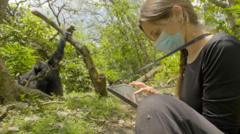In the lush woodlands of southwest Virginia, a movement is gaining momentum among local farmers and herbal enthusiasts aimed at restoring the forest economy built on traditional medicinal herbs. This initiative not only seeks to preserve cultural heritage but also to make the market for herbal supplements more sustainable and profitable.
Dr. Ryan Huish, a biology professor at the University of Virginia’s College at Wise, is at the forefront of this endeavor. His family’s 60-acre property near Duffield serves as an outdoor classroom where students learn about the diverse range of edible plants. From ramps, known for their garlic-like flavor, to trout lilies and spicy Appalachian wasabi, these plants have been integral to the local culture, used for food and traditional medicine for centuries.
Despite their historical value, the market surrounding these forest botanicals has faced challenges, including low prices and overharvesting due to lack of regulations. Katie Commender, director of the agroforestry program at Appalachian Harvest Herb Hub, notes that the trade of forest plants has spanned over 300 years but risks fading as younger generations are less engaged with this tradition.
The initiative, part of the broader "50 States, 50 Fixes" project, emphasizes local solutions to environmental issues while focusing on community-led efforts to sustain traditional practices. As farmers collaborate on innovative strategies to revitalize this ancient trade, they aim not only to protect their forest resources but also to forge a future where both cultural heritage and economic life thrive hand in hand.





















